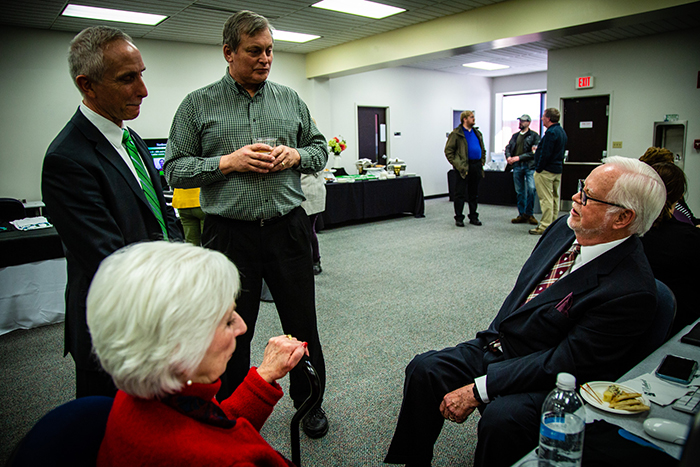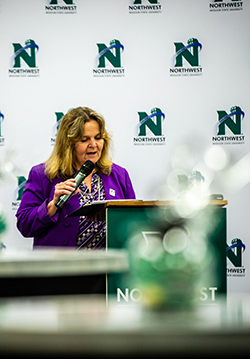
Northwest President Dr. John Jasinski (standing at left) converses with President Emeritus Dr. Dean Hubbard (seated at right), during an event to celebrate the 20th anniversary of the launch of Northwest Online. Also pictured are former first lady Aleta Hubbard and Associate Professor of Geography Dr. Ted Goudge. (Photos by Carly Hostetter/Northwest Missouri State University)
Feb. 14, 2019
From Colorado to Africa, Northwest Online marking 20 years of delivering course content to students beyond traditional campus
 |
Dr. Darla Runyon, the director of Northwest's Learning and Teaching Center and an original staff member in the University's CITE office, recalls the early days of Northwest Online during the institution's anniversary celebration. |
Past and present faculty, staff and administrators of Northwest Missouri State University gathered Tuesday to celebrate 20 years of providing affordable online education through its Northwest Online program.
Since launching with nine courses and an enrollment of 57 students in August 1999, Northwest Online has evolved into an internet portal and a course management system that offers coursework and valuable education resources for students as well as faculty. Additionally, Northwest’s Learning and Teaching Center supports faculty through the development and sharing of pedagogical and content-specific knowledge while providing access to professional development support and resources.
Today, 536 Northwest Online courses exist with nearly 3,000 students enrolled each semester. Most Northwest Online students are campus-based, but the courses enroll students from throughout the world. It consists of 11 online graduate programs, three bachelor’s degree completion programs and at least one general education course for each academic area. Blended courses consisting of a combination of online and classroom coursework also are established within Northwest Online.
Northwest President Dr. John Jasinski noted Northwest Online enrollments are at their highest during summer months, as students are completing internships away from campus or return to their hometowns to live with parents and work summer jobs. Northwest Online provides opportunities for students to continue working toward their degrees without disruption.
“It helps our students get through the pipeline more quickly and focus on completion – to do the things that Northwest has been so good about in the last many decades,” Jasinski said. “That is not just enrollment, but retention, graduation and placement and lifelong learning.”
The impetus for Northwest Online can be traced back to 1987 when Northwest, propelled by the vision of then-president Dr. Dean Hubbard, flipped the switch on its “Electronic Campus” and became the first public institution in the nation with networked computers in each residence hall room and faculty office. A decade later, Northwest had upgraded the network and all of its computer terminals, allowing students and faculty to use multimedia and the internet while further enhancing learning at the University.
During the late 1990s, the University established its Center for Information Technology in Education, or CITE, with state-provided mission enhancement funding to support the instructional technology needs at Northwest. Hubbard, who served as Northwest’s president from 1984 until 2009, explained during his remarks Tuesday that the purpose of CITE was to use the technology available then to provide students with more accessibility to a Northwest education.
Northwest formed a partnership with the Colorado Community College System that allowed students to transfer from a community college and complete bachelor’s degrees in business through Northwest Online. In December 2001, Christina Pasqua of Sterling, Colorado, became the first student to complete a degree through Northwest Online, earning her bachelor’s in business management. When she arrived to participate in Northwest’s winter commencement ceremony, it marked her first visit to the Maryville campus.
“What’s made it work,” Hubbard told faculty and staff gathered for the anniversary event, “is your willingness to innovate and adapt to the changing needs and approaches in the marketplace. As the needs of people in the marketplace have evolved, you’ve evolved with it. What we always said is we didn’t want to be on the leading edge. We wanted to be on the cutting edge.”
Staff and faculty on Tuesday also recalled some of the early challenges and skepticism with Northwest Online. Dr. Darla Runyon was one of five staff members working in the CITE office when Northwest Online launched. CITE has since been renamed and evolved into the Learning and Teaching Center, and Runyon serves as its director.
Now, enrolling in Northwest Online coursework is an automated process, but it wasn’t that way 20 years ago, Runyon said.
“We’ve come a long way since 1999,” she said. “I recall at the beginning of a semester, I would spend weekends and evenings creating course sites manually, enrolling students manually, enrolling faculty manually, constantly checking my email to make sure that everybody was ready for that first semester. It was a lot of work.”
Dr. Jim Eiswert, a retired philosophy instructor, was among the first Northwest faculty members to translate one of his courses to the online format. Eiswert said he initially had trouble grasping the idea of teaching online with a discipline that prided itself on engagement, dialogue and face-to-face contact. Eventually, he and the CITE team devised a course curriculum that involved producing and mailing an interactive CD to students enrolled in online philosophy courses.
“Somewhere in this process, it dawned on me that maybe I was asking the wrong question,” Eiswert said. “It’s not a question of, ‘How do I make the online experience as approximate to a live class situation, but how can I mutually feed off of both to enrich both environments?’ As our platforms developed over the years, we found more and more ways to make that kind of interaction and interface possible.”
Dr. Greg Haddock, who now serves as associate provost of graduate studies and special programs at Northwest, was a faculty member in the University’s geography program. He recalled Hubbard suggesting to him in 2002 that the department consider an online program for geographic information science, or GIS. That request led to Northwest launching its popular online master’s degree program in GIS.
“All the things we talk about – image processing, spatial modeling, geostatistical analysis and, of course, regular GIS methodologies and techniques – I was thinking in my mind, ‘There is no way,’” Haddock said.
Haddock added, “After several conversations with our colleagues, we began to work on a proposal and then what we found out was – in asking people, ‘Would you be interested in a program like this? – the responses that we got back were, ‘When are you starting it? I want this now.’ That was the beginning of graduate online education at Northwest Missouri State University.”
This spring, the enrollment of online-only students at Northwest exceeded 1,000 for the first time.
“We’ve been blessed to have a strong presence online today and it will grow,” Jasinski said. “All of that doesn’t happen without foresight, without vision and if you think about Dr. Dean L. Hubbard, our ninth president at Northwest Missouri State University, I don’t think you can not put vision, not put innovation in the same sentence with Dean. He read the demand signals for online education way, way in front of many others.”